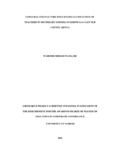| dc.description.abstract | The objectives of the study sought to determine the extent to union related factors have influenced satisfaction of teachers in Kirinyaga East sub County. The study adopted descriptive survey design. The population of the study consisted of 10 secondary schools in Kirinyaga East Sub County. The sample of 128 respondents was selected using random stratified sampling. The data was collected using self administered questionnaires. Both descriptive and content analyses were used in the data analysis. The Statistical Package for Social Sciences was used to tabulate the data in terms of working means, standard deviations and percentages to answer the research questions thereby addressing the objectives of the study. The findings of the study were as follows: First, on the question of the extent to which perceived bargaining power influence teachers’ satisfaction in Kirinyaga East Sub County, it was found that most of the respondents at 46 percent felt that the unions failed to bargain for pay increase this is an undesirable character trait of the teachers union which increased their dissatisfaction with the unions.
Secondly on the question as to whether attitude towards union leadership influence teachers’ satisfaction, the study found out that most of the respondents at 39 per cent felt that the leadership is satisfactory. Thirdly, on the question on whether peer pressure influence teachers’ satisfaction, it was found out that majority of the teachers (58%) were highly influenced by their workmates or friends to join their trade unions. Fourthly, on the question as to whether union response to members’ needs influence secondary school teachers’ satisfaction, the study found that a majority of respondents (75%) felt that response to members’ needs was delayed. The study found out that the teachers felt that trade union did not adequately help in addressing the challenges faced by teachers in their working environment. The teachers were dissatisfied with how the union presented in legal matters in the course of their duties, job security and victimization. They also felt that the unions did not provide avenues to address grievances adequately and they were dissatisfied with the trade unions provision of access to information. Teachers were dissatisfied with promotions on the basis of ability, policies followed and how regular they were.
The study concludes that poor service delivery in terms of bargaining for pay and allowance increase affects the union negatively. Failure to involve union members in key-decision making processes leads to loss of members to rival union.
This study recommends that the union should enhance its service delivery to the members through actively bargaining for pay and allowance increase by the teachers’ employer. The union should embark on involvement of union members in key decision making procedures as well as conducting free and fair election.
The study suggests that further research is necessary in other counties to find the factors affecting satisfaction of secondary teachers. | en_US |



